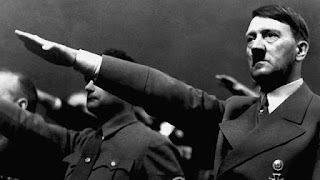Adolf Hitler
Adolf Hitler was a German politician who rose to power as the leader of the National Socialist German Workers' Party (Nazi Party). Born on April 20, 1889, in Braunau am Inn, Austria-Hungary, Hitler's early life was marked by a desire to become an artist, but he later shifted his focus to politics.
Hitler's political career gained momentum in the 1920s when he joined the Nazi Party. He became its leader in 1921 and attempted to overthrow the Weimar Republic in 1923 with the failed Beer Hall Putsch. Subsequently, he was imprisoned, during which time he wrote his autobiography and political manifesto, "Mein Kampf" (My Struggle), outlining his anti-Semitic, anti-communist, and nationalist ideologies.
The global economic depression of the 1930s provided fertile ground for Hitler's rise to power. In 1933, he was appointed Chancellor of Germany by President Paul von Hindenburg. Hitler swiftly consolidated his control, dismantling democratic institutions and establishing a totalitarian regime. In 1934, after Hindenburg's death, Hitler combined the roles of Chancellor and President, declaring himself Führer und Reichskanzler (Leader and Chancellor).
One of Hitler's central objectives was the establishment of a racially pure Aryan state. His anti-Semitic beliefs led to the implementation of discriminatory laws against Jews, culminating in the systematic persecution and genocide known as the Holocaust. The Nuremberg Laws of 1935 stripped Jews of their German citizenship and prohibited them from marrying or having sexual relations with non-Jews.
Hitler's aggressive foreign policy aimed at territorial expansion and the creation of a Greater German Reich. The invasion of Poland in 1939 marked the beginning of World War II, as it prompted Britain and France to declare war on Germany. Hitler's military strategies, such as the Blitzkrieg, initially led to rapid victories, but the tide turned against Germany with the entry of the Soviet Union and the United States into the war.
As the war progressed, Hitler's leadership style became increasingly erratic and detached from reality. The failure of Operation Barbarossa, the invasion of the Soviet Union, marked a turning point, leading to a series of defeats for the German military. The Allied forces, composed of the United States, the Soviet Union, the United Kingdom, and others, began to gain the upper hand.
In the final days of the war, facing imminent defeat, Hitler retreated to his underground bunker in Berlin. On April 30, 1945, realizing the futility of the situation, he committed suicide by gunshot. Germany surrendered shortly afterward, bringing an end to World War II in Europe.
The legacy of Adolf Hitler is one of infamy and horror. The Holocaust resulted in the systematic genocide of six million Jews and millions of others deemed undesirable by the Nazi regime. Hitler's aggressive expansionist policies plunged the world into a devastating conflict that resulted in the loss of millions of lives. The atrocities committed during his rule serve as a stark reminder of the consequences of unchecked authoritarianism and prejudice.




Comments
Post a Comment